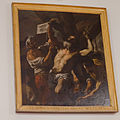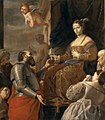| Mattia Preti | |
|---|---|
 Self-portrait in the painting Predica di San Giovanni Battista Self-portrait in the painting Predica di San Giovanni Battista | |
| Born | (1613-02-24)24 February 1613 Taverna, Calabria, Kingdom of Naples |
| Died | 3 January 1699(1699-01-03) (aged 85) Valletta, Hospitaller Malta |
| Nationality | Italian |
| Style | Baroque painting |
| Signature | |
Mattia Preti (24 February 1613 – 3 January 1699) was an Italian Baroque artist who worked in Italy and Malta. He was appointed a Member of the Order of Saint John.
Life

Born in the small town of Taverna in Calabria, Preti was called Il Cavalier Calabrese (the Calabrian Knight) after appointment as a Knight of the Order of St. John (Knights of Malta) in 1660. His early apprenticeship is said to have been with the "Caravaggist" Giovanni Battista Caracciolo, which may account for his lifelong interest in the style of Caravaggio.
Probably before 1630, Preti joined his brother Gregorio (also a painter), in Rome, where he became familiar with the techniques of Caravaggio and his school as well as with the work of Guercino, Rubens, Guido Reni, and Giovanni Lanfranco. In Rome, he painted fresco cycles in the churches of Sant'Andrea della Valle and San Carlo ai Catinari. Between 1644 and 1646, he may have spent time in Venice, but remained based in Rome until 1653, returning later in 1660–61. He painted frescoes for the church of San Biagio at Modena (app. 1651–2) and participated in the fresco decoration of the Palazzo Pamphilj in Valmontone (documented 1660–61), where he worked along with Pier Francesco Mola, Gaspar Dughet, Francesco Cozza, Giovanni Battista Tassi (il Cortonese), and Guglielmo Cortese.
During most of 1653–1660, he worked in Naples, starting with a Saint Nicholas. There he was influenced by another prominent painter of his era, Luca Giordano. Preti's major works include a series of large fresco ex-votos depicting the Virgin or saints delivering people from the plague, which were painted on seven city gates and are now lost - two sketches for them are in the Capodimonte Museum in Naples, including a bozzetto of the Virgin with the baby Jesus looming over the dying and their burial parties which envisions a Last Judgement presided over by a woman. Preti also won a commission to supervise the construction, carving, and gilding for the nave and transept of San Pietro a Maiella, along with producing a Judith and Holofernes and Saint John the Baptist, both still in Naples.

Having been made a Knight of Grace in the Order of St John, he visited the order's headquarters in Malta in 1659 and spent most of the remainder of his life there. Preti transformed the interior of St. John's Co-Cathedral in Valletta with a huge series of paintings on the life and martyrdom of St. John the Baptist (1661–1666). In Malta one also can find many paintings of Preti in private collections and in parish churches. His increased reputation led to an expanded circle of patrons, and he received commissions from all over Europe.
While in Malta, Preti owned a slave who modelled for his paintings.
Preti was fortunate to enjoy a long career and have a considerable artistic output. His paintings, representative of the exuberant late Baroque style, are held by many great museums, including important collections in Naples, Valletta, Palermo, and in his hometown of Taverna, Calabria.
Legacy
In the Manderaggio area of Valletta, there is a town square named after him, Mattia Preti Square (Maltese: Misraħ Mattia Preti). In this square there is also a commemorative bust of him, which was unveiled by the Local Council of Valletta in 2014.
Gallery
-
 Sant'Antonio Abate c.1628, 62 x 62 cm, private collection
Sant'Antonio Abate c.1628, 62 x 62 cm, private collection
-
 The Concert c.1630, Hermitage Museum, Saint Petersburg
The Concert c.1630, Hermitage Museum, Saint Petersburg
-
 Homer c.1635, 102 x 81 cm, Gallerie dell'Accademia, Venice
Homer c.1635, 102 x 81 cm, Gallerie dell'Accademia, Venice
-
 The Martyrdom of St. Bartholomew c.1650, Basilica of St. Joseph Proto-Cathedral
The Martyrdom of St. Bartholomew c.1650, Basilica of St. Joseph Proto-Cathedral
-
 The Marriage at Cana c.1655-1660, National Gallery, London
The Marriage at Cana c.1655-1660, National Gallery, London
-
 Pilate Washing His Hands, c. 1663, The Metropolitan Museum of Art, New York
Pilate Washing His Hands, c. 1663, The Metropolitan Museum of Art, New York
-
 Calling the Apostle Matthew c. 1630-1640, 104 x 164 cm, Kunsthistorisches Museum, Vienna
Calling the Apostle Matthew c. 1630-1640, 104 x 164 cm, Kunsthistorisches Museum, Vienna
-
 Unbelieving Thomas, c. 1656-1660, 187 x 145 cm, Kunsthistorisches Museum
Unbelieving Thomas, c. 1656-1660, 187 x 145 cm, Kunsthistorisches Museum
-
 Christ in Glory with Saints, 1660-1661, Museo del Prado, Madrid
Christ in Glory with Saints, 1660-1661, Museo del Prado, Madrid
-
 Tomyris immerses Cyrus's head in a skin bag of blood, 1685-89, 174 x 213, Louvre, Paris
Tomyris immerses Cyrus's head in a skin bag of blood, 1685-89, 174 x 213, Louvre, Paris
-
 The Death of Sophonisba c.1660-1670, 198 x 174 cm, Museum of Fine Arts of Lyon
The Death of Sophonisba c.1660-1670, 198 x 174 cm, Museum of Fine Arts of Lyon
-
 The Vanity, 1650-1651, 93,5 x 65 cm, Uffizi, Florence
The Vanity, 1650-1651, 93,5 x 65 cm, Uffizi, Florence
-
 A Mother Entrusting Her Sons to Christ c. 1635-36, 143 x 193 cm, Pinacoteca di Brera, Milan
A Mother Entrusting Her Sons to Christ c. 1635-36, 143 x 193 cm, Pinacoteca di Brera, Milan
-
 The Banquet of the Rich Glutton c.1665, 148 x 200 cm, Gallerie Nazionali di Arte Antica, Rome
The Banquet of the Rich Glutton c.1665, 148 x 200 cm, Gallerie Nazionali di Arte Antica, Rome
-
 Plato and Diogenes c.1688, 101 x 151 cm, Capitoline Museums, Rome
Plato and Diogenes c.1688, 101 x 151 cm, Capitoline Museums, Rome
-
 The Deliverance of St. Peter from Prison, c. 1650, 205 x 226 cm, Gemäldegalerie Alte Meister, Dresden
The Deliverance of St. Peter from Prison, c. 1650, 205 x 226 cm, Gemäldegalerie Alte Meister, Dresden
-
 Saint George on Horseback 1658, 275 x 207 cm, St. John's Co-Cathedral
Saint George on Horseback 1658, 275 x 207 cm, St. John's Co-Cathedral
-
 St John the Baptist Wearing the Red Tabard of the Order of St John 1671, 98 x 78 cm, National Museum of Fine Arts, Malta
St John the Baptist Wearing the Red Tabard of the Order of St John 1671, 98 x 78 cm, National Museum of Fine Arts, Malta
-
 Saint Veronica with the Veil, 1655-1660, 100 x 74 cm, Los Angeles County Museum of Art
Saint Veronica with the Veil, 1655-1660, 100 x 74 cm, Los Angeles County Museum of Art
-
 Saint Paul the Hermit, c. 1662-1664, 103 x 76 cm, Cleveland Museum of Art
Saint Paul the Hermit, c. 1662-1664, 103 x 76 cm, Cleveland Museum of Art
-
 St. John the Baptist Preaching, c. 1665, Fine Arts Museums of San Francisco
St. John the Baptist Preaching, c. 1665, Fine Arts Museums of San Francisco
-
 Adoration of the shepherds, c. 1678, Walker Art Gallery, Liverpool
Adoration of the shepherds, c. 1678, Walker Art Gallery, Liverpool
-
 Judith and Holofernes, c. 1653-1654, 186 x 143 cm, Museo di Capodimonte, Naples
Judith and Holofernes, c. 1653-1654, 186 x 143 cm, Museo di Capodimonte, Naples
-
 Baldassarre's Feast, 1653-1659, 202 x 297 cm, Museo di Capodimonte
Baldassarre's Feast, 1653-1659, 202 x 297 cm, Museo di Capodimonte
-
 The four Evangelists, 1650, 153 x 207 cm, Palazzo Abatellis, Palermo
The four Evangelists, 1650, 153 x 207 cm, Palazzo Abatellis, Palermo
-
 Christ and the adulteress, 1650, 85 x 117 cm, Palazzo Abatellis
Christ and the adulteress, 1650, 85 x 117 cm, Palazzo Abatellis
-
 Martyrdom of Saint Andrew, 1650-1651, Sant'Andrea della Valle, Rome
Martyrdom of Saint Andrew, 1650-1651, Sant'Andrea della Valle, Rome
-
 Return of the Prodigal Son, 1658, 202 x 285 cm, Royal Palace of Naples
Return of the Prodigal Son, 1658, 202 x 285 cm, Royal Palace of Naples
-
 Aeneas, Anchises and Ascanius Fleeing Troy, 1630, 86 x 153 cm, Gallerie Nazionali di Arte Antica, Rome
Aeneas, Anchises and Ascanius Fleeing Troy, 1630, 86 x 153 cm, Gallerie Nazionali di Arte Antica, Rome
-
 Saint Sebastian, 1660, 240 x 169 cm, Museo di Capodimonte
Saint Sebastian, 1660, 240 x 169 cm, Museo di Capodimonte
-
 Adoration of the Shepherds, 1645, 148 x 197 cm, National Museum, Warsaw
Adoration of the Shepherds, 1645, 148 x 197 cm, National Museum, Warsaw
-
 Martyrdom of Saint Catherine, 1659, 365 x 267 cm, Church of Saint Catherine of Italy, Valletta, Malta
Martyrdom of Saint Catherine, 1659, 365 x 267 cm, Church of Saint Catherine of Italy, Valletta, Malta
-
 Belisarius receiving alms, 1665-1669, 152 x 198 cm, Museum Boijmans Van Beuningen, Rotterdam
Belisarius receiving alms, 1665-1669, 152 x 198 cm, Museum Boijmans Van Beuningen, Rotterdam
References
- John T. Spike, Mattia Preti: I Documenti, Florence: 1999.
- Wittkower, 360
- James Clifton, "Mattia Preti's Frescoes for the City Gates of Naples," Art Bulletin (1994), 479–501
- Clifton, 480. Preti's salary for the work was 1500 ducats.
- Bonello, Giovanni (2000). Art in Malta – Discoveries and Recoveries Archived 2016-08-28 at the Wayback Machine. Fondazzjoni Patrimonju Malti. p. 69-102. ISBN 99909-959-7-4. ISBN 99909-959-8-2.
- Alessandro Cosma. Paintings for the Knights of Malta. Mattia Preti and the Celebration of Martyrdom. Actual Problems of Theory and History of Art: Collection of articles. Vol. 6. Eds: Anna V. Zakharova, Svetlana V. Maltseva, Ekaterina Yu. Stanyukovich-Denisova. St. Petersburg, NP-Print Publ., 2016, pp. 468–473. ISSN 2312-2129.
- Lanfranco, Guido (2007). "Xogħol tal-Iskjavi fost il-Maltin" (PDF). Programm Tal-Festa (in Maltese). Kirkop: Għaqda Mużikali San Leonardu. Archived from the original (PDF) on 15 April 2016.
- "The Marriage at Cana". The National Gallery. Retrieved 2019-11-26.
Further reading
- Spike, John (1997). Mattia Preti e Gregorio Preti a Taverna. Catalogo completo delle opere. Centro Di.
- Spike, John (1999). Mattia Preti. Catalogo Ragionato dei Dipinti. Florence.
{{cite book}}: CS1 maint: location missing publisher (link) - Wittkower, Rudolf (1993). "Art and Architecture Italy, 1600–1750". Pelican History of Art. 1980. Penguin Books Ltd. pp. 330–331.
External links
 Media related to Mattia Preti at Wikimedia Commons
Media related to Mattia Preti at Wikimedia Commons- Christ Seats the Child in the Midst of the Disciples, c. 1680-85. Museum & Gallery, Inc. Greenville, SC
| Mattia Preti | |
|---|---|
| Paintings |
|
| Related |
|
